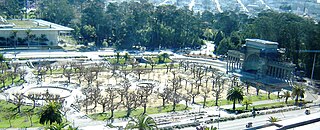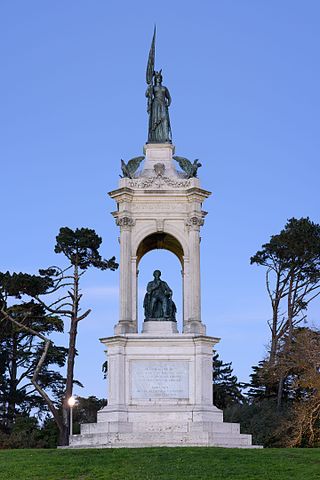
Golden Gate Park is an urban park between the Richmond and Sunset districts of San Francisco, United States. It is the largest park in the city, containing 1,017 acres (412 ha), and the third-most visited urban park in the United States, with an estimated 24 million visitors annually.
The San Francisco Arts Commission (SFAC) is the City agency that champions the arts as essential to daily life by investing in a vibrant arts community, enlivening the urban environment and shaping innovative cultural policy in San Francisco, California. The commission oversees Civic Design Review, Community Investments, Public Art, SFAC Galleries, The Civic Art Collection, and the Art Vendor Program.

Franklin Bachelder Simmons was a prominent American sculptor of the nineteenth century. Three of his statues are in the National Statuary Hall Collection, three of his busts are in the United States Senate Vice Presidential Bust Collection, and his statue of Ulysses S. Grant is in the United States Capitol Rotunda.
Dana King is an American broadcast journalist and sculptor. She served as an anchor for the CBS owned-and-operated station KPIX-TV in San Francisco. In 2012, King left KPIX to pursue her passion in sculpting and art. Her outdoor sculpture commemorating the Montgomery bus boycott is displayed at the National Memorial for Peace and Justice in Montgomery, Alabama. King uses historically generalized and racist ideas that require in-depth researches, to provide information on the normative misrepresentation of Black peoples' emotional and physical sacrifices.

The Music Concourse is an open-air plaza within Golden Gate Park in San Francisco. Flanking the oval-shaped concourse are the M. H. de Young Memorial Museum and the California Academy of Sciences.

Christopher Columbus is a bronze statue of Italian explorer and navigator Christopher Columbus. It was installed during 1933 in Chicago's Grant Park, in the U.S. state of Illinois. Created by the Milanese-born sculptor Carlo Brioschi, it was set on an exedra and pedestal designed with the help of architect Clarence H. Johnston. It was removed and put in storage in 2020.

Johannes Sophus Gelert (1852–1923) was a Danish-born sculptor, who came to the United States in 1887 and during a span of more than thirty years produced numerous works of civic art in the Midwest and on the East Coast.

The Admission Day Monument is an 1897 sculpture by Douglas Tilden, located at the intersection of Market Street and Montgomery Street in San Francisco, California, United States. It commemorates California Admission Day, the date on which the state became part of the Union, following the Mexican–American War of 1848.

A bronze sculpture of American pioneer, newspaper editor and historian Harvey W. Scott (1838–1910) by Gutzon Borglum, sometimes called Harvey Scott or Harvey W. Scott, was installed on Mount Tabor in Portland, Oregon, United States, until being toppled in October 2020.

A statue of Christopher Columbus was installed in Pioneer Park, San Francisco, California.

A 30-foot (9.1 m) tall statue of Junípero Serra was installed in San Francisco's Golden Gate Park, in the U.S. state of California. It had first been erected in 1907 and sculpted by Douglas Tilden. The memorial was toppled on June 19, 2020, during the George Floyd protests, as a Juneteenth commemoration. The next day another memorial for Serra was torn down in Los Angeles at Father Serra Park by about five dozen indigenous activists. Other statues of Junípero Serra were involved as the protests expanded to include monuments of individuals associated with the controversy over the genocide of indigenous peoples in the Americas. Demonstrators also toppled or otherwise vandalized the statues of Francis Scott Key, Ulysses S. Grant, and a group consisting of Don Quixote and his companion, Sancho Panza kneeling to honor their creator, Cervantes.

A memorial statue of Francis Scott Key stood in Golden Gate Park, San Francisco, in the U.S. state of California, from 1888 until 2020.

The Giuseppe Verdi Monument is installed in San Francisco's Golden Gate Park, in the U.S. state of California. The monument was dedicated on March 23, 1914, to the soprano singer Luisa Tetrazzini. Ettore Patrizzi, an Italian newspaper owner, raised $15,000 for the monument through a subscription fund. The monument was made by Orazio Grossoni, an Italian sculptor from Milan.

A bust of the Ethiopian emperor Haile Selassie formerly stood in Cannizaro Park in Wimbledon Common, London. A work of the sculptor Hilda Seligman, it was destroyed in June 2020.

The Ulysses S. Grant Monument is a presidential memorial in Chicago, honoring American Civil War general and 18th president of the United States, Ulysses S. Grant. Located in Lincoln Park, the statue was commissioned shortly after the president's death in 1885 and was completed in 1891. Several artists submitted sketches, and Louis Rebisso was selected to design the statue, with a granite pedestal suggested by William Le Baron Jenney. At the time of its completion, the monument was the largest bronze statue cast in the United States, and over 250,000 people were present at the dedication.














